I recently revamped our debt-snowball to include: our car, & a few student loans that we are responsible for paying off.
So, it looks a bit different from what I shared with you last fall.
One reason (there are many others) that Joseph chose the Air Force is that paying off our student loans, in this lifetime (or a least before our oldest graduates from high school), is actually feasible.
Between the $65K student loan repayment (specific to belonging to the JAG core) & PSLF*(Public Service Loan Forgiveness), we are able to pay off our student loans on a public servant’s salary without living in poverty for the next 20 years.
As I’ve said before, our debt isn’t because of frivolous spending, it’s because we chose to have four children, put Joseph through law school, & had nearly a year & a half of unemployment. Lest I sound holier-than-thou (“my debt is better than your debt, so there!”) I want to make it clear, regardless of the reasons you’re in debt, the more important issue is getting out, & staying out.
Being debt-free (aside from perhaps a mortgage on a modest home within your income) is something that most Americans cannot fathom. I know, for me, there are moments when I see the numbers of what we have to pay off ($92K left!) & at times I find the task arduous, impossible.
So far, we’ve been at the debt-slaying process for about 7 months. We’ve paid off over $13K already, & are on our way to be completely debt-free* by January of 2016.
Here are some things that have been helpful to us.
Putting your debts on paper is scary.
(Believe me, just looking at that $92K number is making me sweat.)
But seeing the numbers, writing them down, is the first step in getting them to go away.
An excel spreadsheet does the trick, & even better, is a free downloadable debt snowball calculator by Vertex, that I have used (& love it) since we started going debt-free.
I highly recommend putting your debts into a debt snowball.
This idea is not unique to Dave Ramsey–many other programs use it & teach it. I know my church teaches it. (More info can be found in One for the Money.)
We are paying our debts off by highest interest rate first. Fortunately, all of our debts have interest rates of 6% or less. Another benefit to being active duty military–all of our debts (except for federal student loans) qualify for SCRA benefits which require that loans not exceed 6%. Our three credit cards carry a 6%, 4%, & 0% interest rate because of SCRA. Otherwise, well, I don’t want to think about the rates at which they used to be!
Even though our interest rates are low, we are still saving at least a thousand dollars in interest by paying off our debts highest interest rate first. I understand the psychology of paying your debts off by lowest balance rather than by interest rate, but I still think that by paying in order of interest rate can save you a lot of money & is more often than not, the better choice.
Budgets used to suck.
I remember getting my first checkbook.
I’m not that old, but in 1999, people still used checks for a lot of stuff. I hated balancing my checkbook & (almost) always failed when I tried to write a budget down on paper & try to stick with it. I remember the bounced checks, the overdraft fees I had to bear as a 16 year old because I forgot to record a check or messed up on my math.
But oh, how the internet & technology has changed all of that.
With everything digital, I can keep track of all my accounts by just going to one site.
(I use mint.com, but there are oodles of free programs that do the same thing.)
I can see in real time where I stand with my budget. There’s very little room for human error when all transactions are made with a debit/credit card & immediately go into our online budgeting system. Joseph can check it whenever he wants, I can check it when I want, & it makes it all very easy to keep track of things.
And, it’s fun. I love how easy technology has made it to track & follow spending.
So make a budget. You have to.
You don’t have the luxury like no-debt folks to be fuzzy on the numbers. You’ve got to make every penny count, & the only way to really do that is by figuring out where you’re money is going.
Make a budget you can live with.
Once you’ve put down all your income & non-negotiable expenses (like rent, utilities, & no a smart-phone is not essential unless it’s for your job, but even then..), make some room for a *few* splurges (we still spend $115 a month on dates & would stop eating before cutting out that expense). Then the rest go towards debt.
Anna, of And Then We Saved, has some great tips for this.
While your goals may change over time, your guiding principles should not.
What are some of your guiding principles?
When Joseph & I sat down & talked about our long-term financial goals, our main guiding principles are: we want to be debt-free, live below our income, & pay a full tithe to our church on 10% of our earnings. Those are principles that we want to live for the rest of our lives.
Beyond that, our current short term goals (other than getting out of debt) include having a 6 months savings & begin saving for retirement as well as save $10K for each child to receive when they graduate high school to help them with a mission, college, &/or trade school.
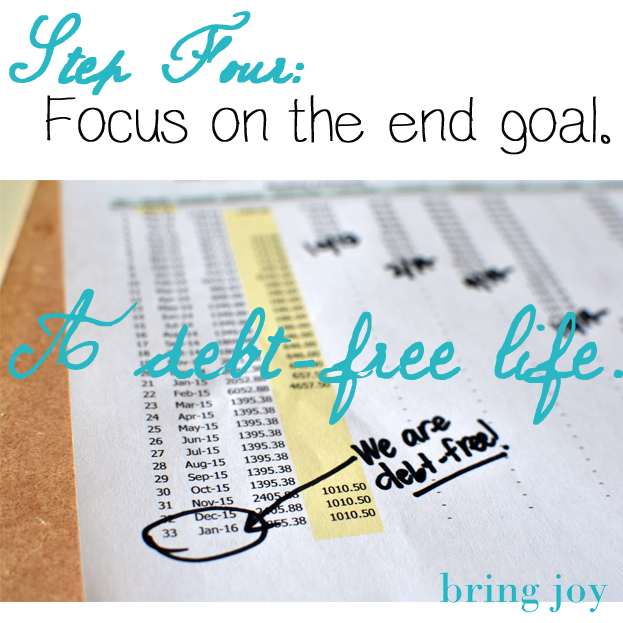 There is (so) much freedom in being debt-free.
There is (so) much freedom in being debt-free.
For me, thinking about that moment, when we pay our last debt, & then knowing that all of our income will be ours to do what with we will is a beautiful, liberating feeling.
Currently we pay nearly $2K a month (all of our income after the “necessities”) towards debt.
By the time we’re debt-free that amount will increase (due to yearly pay increases) to $3400, or thereabouts. I can’t even imagine what we’ll be able to do with that amount of money.
Save for retirement, cars, go on vacation, put our kids in music lessons & sports. The possibilities give me goosebumps.
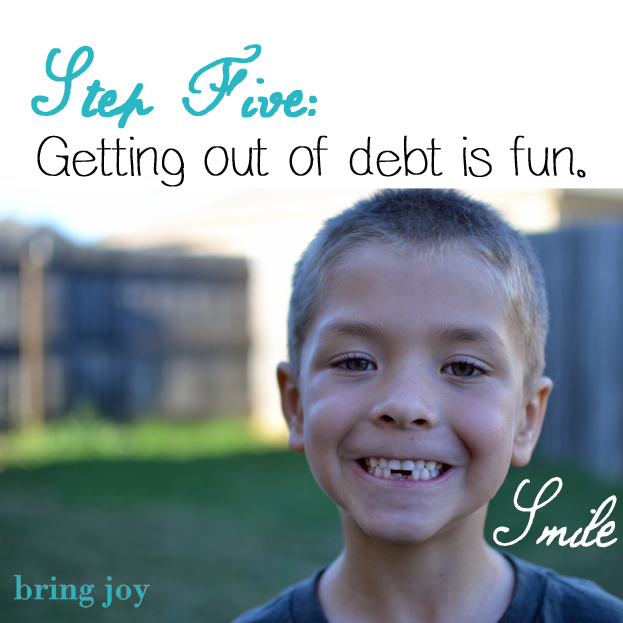 Yesterday I was swimming in our community pool.
Yesterday I was swimming in our community pool.
It was dusk. Joseph was at home watching Harry Potter (the 2nd one) with the kids (he just finished reading the book to them). As I was floating on my back, fluttering my legs, stretching my arms, & gazing at the wide open blue, I was struck by how much I’m loving life in spite of our frugal circumstances.
Do we have a ginormous amount of debt? Yes.
Are we on a strict budget, where every penny is pinched? Yes.
Would most people say we’re crazy because we set our thermostat at 82F & don’t have cable, smart phones, or take vacations even though we “can”? Yes.
But working towards this goal of a better, more free life, in the process, is showing me how much there is in life that is free & good. It also makes me grateful for all the amazing things we do have.
We’re discovering ways to have fun without money. To work together, to communicate. And that, friends, is fun.
*These loans, as long as Joseph is in public service, are paid via this program.
**All debts other than & the mortgage on our home (now a rental property) & $80K in federal student loans that are covered under the PSLF program.
♥♥♥
What do you think the hardest part about getting out of debt is?
What things have you found helpful on your journey to a debt-free life?
or
If you have successfully gotten out of debt &/or are living a debt-free life, please share your insights, tips, words of wisdom.
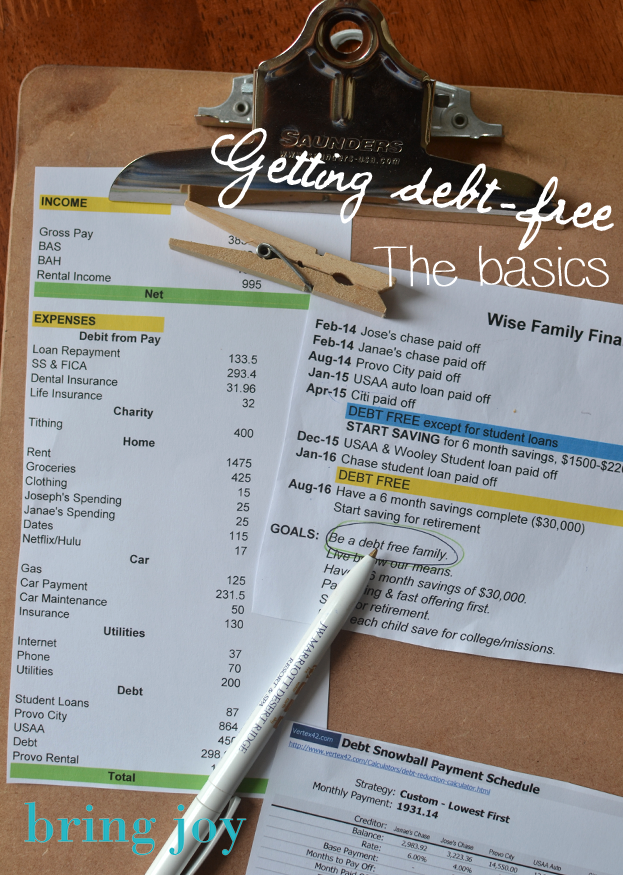
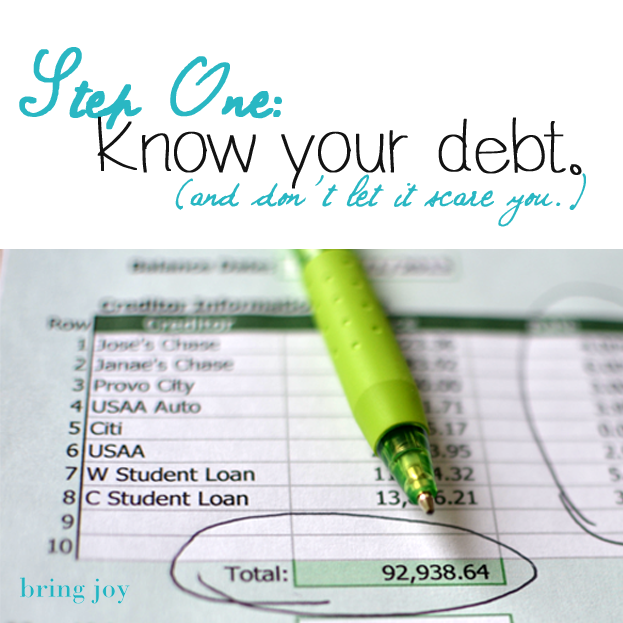
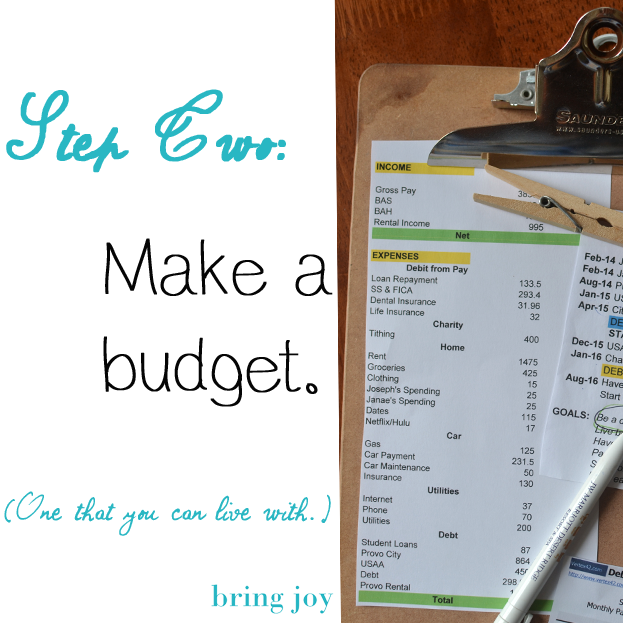
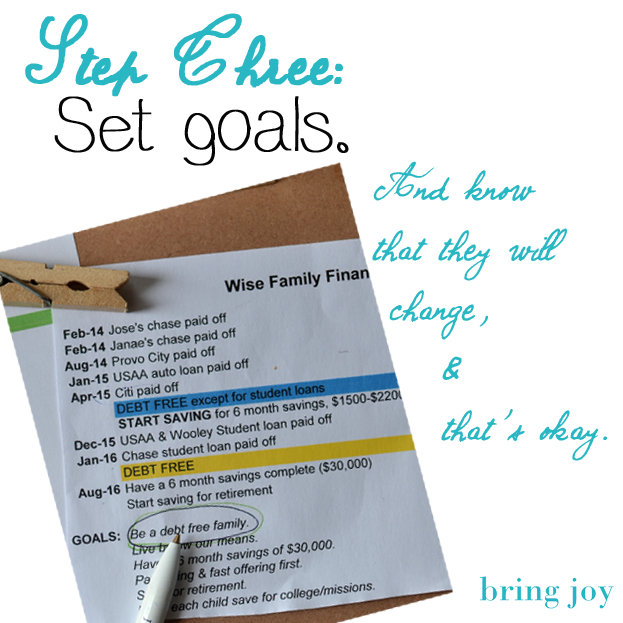



Comments